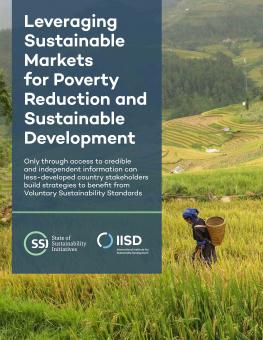
Leveraging Sustainable Markets for Poverty Reduction and Sustainable Development
IISD launched the Leveraging Sustainable Markets for Poverty Reduction and Sustainable Development project, facilitating poverty reduction among marginalized commodity producers by enabling more strategic and proactive entry into value-added sustainable markets for less-developed countries.
The production of sustainable agriculture commodities continues to grow, reaching as high as 20 per cent of palm oil and 30 per cent of cocoa’s global production.
Consumer preferences and purchase decisions are largely driving this trend, motivated by advancing sustainability and reducing poverty in the countries of production. To respond to these consumer demands, hundreds of voluntary sustainability standards (VSSs) and other multistakeholder alliances have emerged over the last three decades as market tools to enhance sustainable development. Over the past decade, consumer preferences have influenced the evolution of VSSs, from serving niche markets to entering the mainstream, where multinational companies have defined sourcing commitments for sustainable agriculture commodities.
To meet this challenge, IISD launched the Leveraging Sustainable Markets for Poverty Reduction and Sustainable Development project. It aims to facilitate poverty reduction among marginalized commodity producers by enabling more strategic and proactive entry into value-added sustainable markets for less-developed countries.
Participating experts
Additional downloads
You might also be interested in
Agreement on Climate Change, Trade and Sustainability: A landmark pact for trade and sustainability
The ACCTS pact, signed by Costa Rica, Iceland, New Zealand, and Switzerland, aligns trade and environmental policies, tackling fossil fuel subsidies, eco-labels, and green trade.
The Responsible Agricultural Investment Tool for Agribusiness and Case Studies
This report summarizes a collaboration to support agribusinesses in complying with principles of responsible investment in agriculture and food systems.
Promoting the Development of Agricultural Cooperatives
Governments in the Global South should promote agricultural cooperatives to boost smallholder access to fair markets, finance, and climate resilience.
Navigating Global Sustainability Standards in the Mining Sector
This brief examines the latest developments and trends in responsible mining standards and voluntary sustainability initiatives.